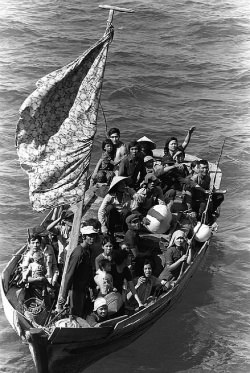 As part of Migration awareness month (August) Bishop Vincent Long Van Nguyen shared his journey from fleeing Vietnam as a refugee, to his ordination as a Franciscan, to finally being appointed a Bishop in Melbourne.
As part of Migration awareness month (August) Bishop Vincent Long Van Nguyen shared his journey from fleeing Vietnam as a refugee, to his ordination as a Franciscan, to finally being appointed a Bishop in Melbourne.
Bishop Long is quietly spoken, and considers each word. He is intelligent and well-read, studious and pastoral.
His experience I share here, knowing that his story could change hearts and minds on this important issue.
Migration awareness month looks at the many and diverse ways that people have come to call Australia home.
Asylum seekers who arrive in this country on leaky vessels are perhaps some of the most misunderstood, and Bishop Long’s story may help us understand why they risk their lives in this way.
‘Our boat journey was risky. There were more people onboard than the boat could carry safely. By the third day, we had run out of food, water and fuel. From then on, we were at the mercy of the elements. On the seventh day, we drifted near an oil rig, half alive and half dead’, he said.
Fortunately, Bishop Long and some family members were rescued and brought to a refugee camp off the coast of Malaysia. He stayed there for a year and four months.
‘In December 1981, I was accepted and brought to a country I knew nothing about: Australia.’
The decision to become a priest or a religious is often quite complex and multifaceted.
‘In my case, it began when I was 13 years of age, living in one of the most turbulent periods of my country’s history.’
‘The decision to become a priest was initially motivated by a desire to help people who suffered. Then, as I became more mature, I was able to test and deepen that desire in the context of my faith and lived experience.’
Bishop Long says that it was his encounter with the Franciscan Friars in the Melbourne suburb of Springvale, following his arrival in Australia in 1981, which was critical to his vocation discernment.
It was the friars’ ‘simplicity and especially their service to the marginalised’ that appealed to Bishop Long immediately.
Bishop Long was ordained a priest of the Order of Friars Minor Conventual (O.F.M. Conv) on 30 December 1989 and appointed Auxiliary Bishop of Melbourne on 20 May 2011 at the age of 49.
Bishop Long shares the difficulty of forced separation of families as one of the cruelest products of the refugee experience.
‘I myself was on my own when I set foot here. This resulted in a profound sense of dislocation and isolation.’
He describes the Melbourne suburb of Springvale as ‘a true melting pot’ where there was generally ‘more tolerance in a predominantly migrant suburb than other places.
‘Once I had eggs thrown on my back by a group of youngsters. But they were isolated instances. On the whole, I felt accepted and this sense of acceptance increased gradually as I assimilated into Australian society.’
Vietnamese refugees arrived en masse in Australia during the seventies and eighties.
‘Today, Asian Australians have joined the mainstream in every aspect of our society. Even the sceptics of multiculturalism would concede that Australia has evolved to become a much more dynamic, diverse and interesting place.’
Bishop Long appeals to our Government for a more humane policy towards asylum seekers, ‘one that is in accordance with our international obligations, our status as a prosperous and civilised society and our tradition as a generous and welcoming country’.
Bishop Long cautions that ‘Australia risks dishonouring its own legacy of “a fair go” for the way it dehumanises asylum seekers’.
‘Australia changed for the better as it always has with each successive wave of new arrivals. Australia is what it is today because of their determination and drive for a better future. We honour the legacy of this great nation not by excessive protectionism, isolation and defence of our privilege at all costs. Rather, we make it greater by our concern and care for asylum seekers in the spirit of compassion and solidarity’, he explains.
‘From a religious perspective, human life is sacred because each person is created in the image of God. The human dignity and human rights of asylum seekers and refugees must be respected, regardless of their citizenship, visa status or mode of arrival.
‘We should all learn from the example of Jesus, who was a refugee himself in Egypt and who identified with the marginalised and persecuted, ‘he inspires all Christians to work for a better world, for a better society and especially for the protection and care of asylum seekers and refugees.’
Aoife Connors is Communications Director for the Australian Catholic Bishops Conference.